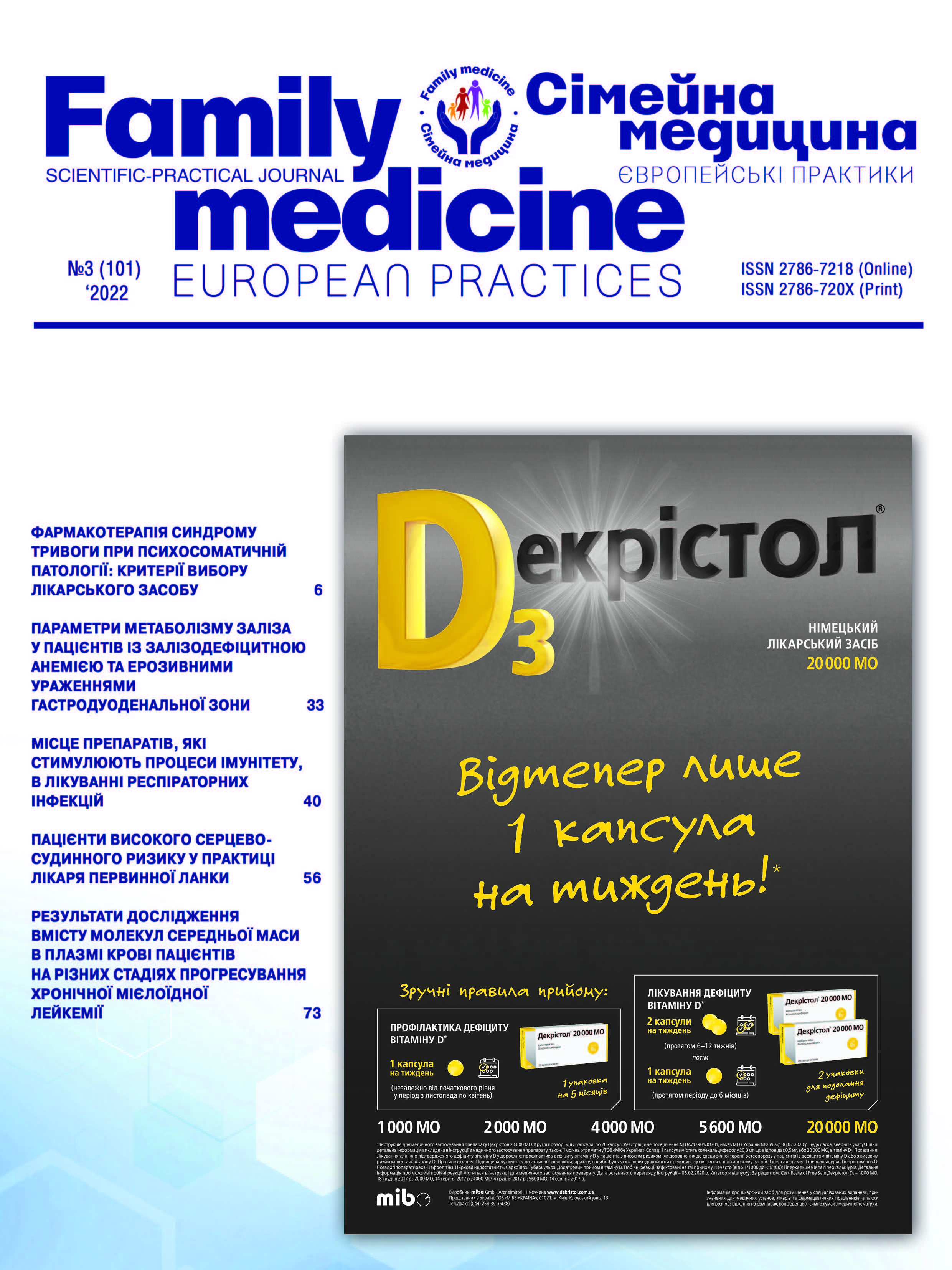Формування компетентнісної моделі спеціаліста – важлива умова якісної підготовки сімейного лікаря на додипломному рівні
##plugins.themes.bootstrap3.article.main##
Анотація
Компетентнісно-орієнтоване навчання стає основним напрямком розвитку вищої освіти в Україні, що вимагає впровадження нових методик викладання. Основна цінність проектної технології навчання полягає в орієнтуванні студентів на створення інтелектуального або матеріального продукту, а не на просте вивчення певної теми. Це форма організації занять, яка спрямована розвиток комунікативних навичок, вміння працювати у різноманітних групах.
Мета дослідження: розкрити сутність і методологію впровадження у навчальний процес на кафедрі терапії та сімейної медицини медичного факультету методу проектів при викладанні дисципліни «загальна практика–сімейна медицина» на додипломному рівні.
Матеріали та методи. Апробовано метод проектної діяльності студентів у «Клініці, дружній до молоді» у практичній підготовці студентів. Основою застосування проектної технології була наявність проблеми медичних і соціальних факторів, які впливають на здоров’я підлітка, що вимагає інтегрованих знань і дослідницького пошуку її вирішення. Студентами було створено та реалізовано проекти медико-соціальної профілактики серед підлітків.
Результати. У результаті роботи над проектом студентами було віднайдене конкретнее вирішення поставленої проблеми та придатний до впровадження конкретний результат. Такий підхід створює умови для творчого розвитку та самореалізації студентів, формування всіх необхідних фахових і загальних життєвих компетенцій.
Висновки. Проектна технологія є основною технологію формування ключових професійних та загальнокультурних компетентностей учнів, допомагає студентам опанувати базові знання, здобути комунікативні та соціальні навички, розвинути аналітичне мислення, дослідницькі уміння, творчі здібності.
##plugins.themes.bootstrap3.article.details##

Ця робота ліцензується відповідно до Creative Commons Attribution 4.0 International License.
Автори зберігають авторське право, а також надають журналу право першого опублікування оригінальних наукових статей на умовах ліцензії Creative Commons Attribution 4.0 International License, що дозволяє іншим розповсюджувати роботу з визнанням авторства твору та першої публікації в цьому журналі.
Посилання
Babinets LS, Zhdan VM, Mykhailovska NS, et al. Lviv Primary medical care: manual: in 2t: Multidisciplinary issues in general medical practice. Lviv: Magnolia 2006; 2021, p. 93–114.
Babinets LS, editor. Competency approaches in the training of personnel in the specialty General practice-family medicine: educational and methodological manual. Ternopil: Yu.V. Osadtsa; 2022, p. 56–61.
Babinets LS, editor. Current aspects of higher medical education in the specialty General practice-family medicine: educational and methodological manual. Ternopil: Yu.V. Osadtsa; 2021, p. 73–84.
Zakon Ukrayiny. Pro vyshchu osvitu [Internet]. 2014. Nakaz 1556-VII. 2014 Lyp 01. Available from: http://zakon4.rada.gov.ua/laws/show/1556-18.
Kvasko OYu, Kondaurova AYu. The experience of using the latest modern teaching methods in the educational process of the National Medical University named after O. O. Bogomolets. Actual problems of higher medical education and science: materials Vseukr. science and practice conf. interlocutor participation; 2021 Apr 08; Kharkiv. Kharkiv: Kh-NMU; 2021, p. 83–4.
Yehudina ED, Sapozhnychenko LV, Kozlova YuV. Implementation of the case method in the formation of clinical thinking of medical students. Medical Educ. 2019;2:79–85.
Buryak OG, Pavlyukovich ND, Pavlyukovich OV, Chimpoi KA. Formation of clinical thinking of students using situational tasks. Med Educ. 2019;1:10–2.
Lopina N, Zhuravlyova L. Practically-oriented method of case study in continuous medical education based on information web technologies. Continuous professional education: theory and practice (series: pedagogical sciences). 2018;(3–4):67–73.
Karpova ME. Analysis of the views of Ukov residents regarding the training of future pediatricians. Collection of science Proceedings of the Kherson State University. Pedagogical Scie. 2018;82(3):141–4.
Mudryk UM, Boyarchuk OR, Volyanska LA, Burbela EI. The use of active forms of learning and modern information technologies as a means of intensification of the educational process. Med Educ. 2020;3:94–9. doi 10.11603/me.2414-5998.2020.3.11447.
Pertseva TO. Interactive technologies of educational and cognitive activity – innovative methods of mixed learning. Med Educ. 2018;(4):73–6.
Dashchuk AM, Dobrzhanska EI. The role of research work in the development of creative abilities of a student. Current issues of higher medical (pharmaceutical) education: today’s challenges and prospects for their solution. In: Material XVIII Vseukr. science and practice conf; 2021 May 20-21; Ternopil. Ternopil: TNMU; 2021, p. 173.
Belyaeva OM. Development of pedagogical skills of teachers of higher medical educational institutions: problems and solutions. Pedagogy Psychol. 2018;VI (63)(153):15–9.
Zadyraka DA, Ryabokon YuYu, Ryabokon OV, Romanova KB. Implementation of problem-oriented learning using virtual patients at the post-graduate stage of education. Current issues of distance education. In: Vseukr. science and method video conference from international participation; 2020 Nov 19-20; Zaporizhia. Zaporizhzhia; 2020, p. 102–3.
Avramenko MO. Furyk OO, Kompaniiets VM. Results of implementation of D-PBL with virtual patients in the frames of TAME: training against medical errors project realization in surgery. In: 3rd International Conference on Medical Education Informatics; 2018 Sept 6-7; Leeds. Leeds; 2018, p. 39–40.
Melnychuk IM. The use of interactive teaching methods in training future pediatricians to work in a team. Med Educ. 2020;4:43–6.
Kirik T. In search of new educational paradigms for Ukraine of the 21st century. Higher Educ Ukr. 2016;3:30–6.
Shulgin NA. Medical and social work in health care institutions. Nursing. 2020;2:66–8.
Myronchuk NM. The application of the project method in the preparation of future teachers for self-organization in professional activity. Probl Educ: Col. Scie Works. 2017;87:191–6.
Ministerstvo okhorony zdorovya Ukrayiny. Pro udoskonalennya orhanizatsiyi nadannya medychnoyi dopomohy dityam pidlitkam ta molodi [Internet]. 2009. Nakaz № 383. 2009 Cherv 02. Available from: https://zakon.rada.gov.ua/rada/show/v0383282-09#Text.
Ventres, WB. Becoming a Doctor: One Physician’s Journey Beyond Competence. J Grad Med Educ. 2014;6(4):631–3. doi: 10.4300/JGME-D-14-00144.1.
McClelland DC. Identifying competencies with behavioral-event interviews. Psychol Scie.1998;9(5):331–9. doi: 10.1111/1467-9280.00065
Kollmer Horton ME. The orphan child: humanities in modern medical education. Philos, Ethics, Humanit Med. 2019;14(1). doi 10.1186/s13010-018-0067-y.
Leif M, Semarad N, Ganesan V. Selting K, Burr J, Svec A, et al. The quality of evidence in preclinical medical education literature: a systematic review. Adv Med Educ Pract. 2019;10:925–33. doi: 10.2147/AMEP.S212858.
Khaniukov O, Kozlov S, Yehudina Y, Sapozhnychenko L, Kozlova Y, et al. Formation and improvement of clinical thinking in medical students. Medicni perspektivi. 2019;24(1):15–20.
Jorm C, Roberts C. Using complexity theory to guide medical school evaluations. Acad Med. 2018;93(3):399–405. doi: 10.1097/ACM.0000000000001828.
Fanning R, Gaba D. The role of debriefing in simulation-based learning. Simulation in Healthcare: J Soc Simul Healthcare. 2007;2(2):115–25. doi: 10.1097/SIH.0b013e3180315539.





